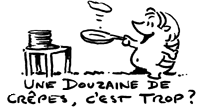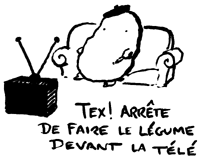Determiners
Expressions of quantity: beaucoup de, un peu de, etc.
There are many ways of expressing quantity: numbers (deux crêpes), the indefinite article (un tatou, an armadillo), and the partitive article (du lait, some milk). Quantities may also be expressed using adverbs and adverbial expressions, such as assez (enough), beaucoup (a lot), or trop (too much).
When used with nouns, expressions of quantity are always followed by de (d’ if the noun begins with a vowel sound).
| Tammy et Tex reçoivent des amis ce soir. Tammy est dans la cuisine. Tex regarde la télévision. | Tammy and Tex are having some friends over tonight. Tammy is in the kitchen. Tex is watching television. | |
| Tammy: Une douzaine de crêpes, c’est trop pour quatre personnes? | Tammy: A dozen crepes, that’s too much for four people? | |
| Tex: Mais non, Tammy, ce n’est pas assez. Il faut préparer beaucoup de crêpes. | Tex: No, Tammy, it’s not enough. You can never prepare too many crepes. |

Here is a list of common adverbial expressions of quantity:
| assez de | enough |
| beaucoup de | a lot |
| un peu de | a little |
| plein de | many |
| un tas de | a lot of |
| trop de | too many |
Note that these expressions of quantity do not change in negative sentences:
| Tex: On ne prépare jamais trop de crêpes. | Tex: One never prepares too many crepes! |
One can express quantity by using specific nouns or adverbs of quantity, as well as measures of weight, distance, or volume, especially in reference to food. For example:
| une boîte de | a can (box) of |
| un bol de | a bowl of |
| un bout de | a piece (end) of |
| une bouteille de | a bottle of |
| une cuillère de | a teaspoon of |
| une douzaine de | a dozen |
| 50 grammes de | 50 grams of |
| un kilo de | a kilo of |
| un litre de | a liter of |
| une livre de | a pound of |
| un morceau de | a piece of |
| une part de | a serving of |
| une pincée de | a pinch of |
| une tasse de | a cup of |
| une tranche de | a slice of |
| un verre de | a glass of |
The definite article (le, la, les) may be used with these expressions to indicate a quantity of a specific item. Remember that de + le and de + les form the contractions du and des respectively.
| un morceau du gâteau qu’Edouard a préparé | a piece of the cake that Edouard made | |
| un verre du vin rouge, pas du blanc | a glass of the red wine, not the white one | |
| beaucoup des invités parlent français | many of the guests speak French |

Listen to the dialogue:
| Tammy lit la recette: Pour une douzaine de crêpes, mélanger 400 grammes de farine et deux oeufs. Ajouter ensuite un demi litre de lait, une cuillère de sel et une cuillère d‘huile. | Tammy reads the recipe: For a dozen crêpes, mix 400 grams of flour and two eggs. Then add half a liter of milk, a spoonful of salt and a spoonful of oil. | |
| Tammy: Dis, Tex! Arrête de faire le légume devant la télé! Viens m’aider! | Tammy: Hey, Tex! Stop vegging out in front of the TV! Come and help me! | |
| Tex: Comment? J’ai fait mon travail, moi! Le bouquet de roses et la bouteille de cidre sont sur la table! | Tex: What? I did my job! The bouquet of flowers and the bottle of cider are on the table! |

